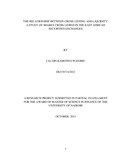| dc.description.abstract | Cross listing has become a common feature in developing countries financial structures. The same trend has been replicated in the emerging economies as well. Many reasons have been advanced as the driving forces behind companies listing their securities in other financial markets in addition to listing in their primary markets. This study sought to evaluate the relationship between cross listing and the liquidity of the cross listed
shares. This is because cross listing has been associated with improved liquidity of shares in the developed markets. This study sought to establish whether there is indeed a relationship between cross listing and liquidity of the cross listed shares in the East African Securities Exchanges. It is noted in papers that encompass liquidity that liquidity represents the possibility of any form of asset to be transformed into another form of
asset in a short period without losing its value considerably. The population of the study was the entire firms cross listed in the East African Securities Exchanges namely: East African Breweries Limited, Equity Bank Limited, Jubilee Holdings Limited, Umeme Limited, Centum Investments Limited, Kenya Airways Limited, Kenya Commercial Bank Limited and Nation Media Group Limited. The study was carried out by use of an event study research design.
By use of an analytical regression model and the application of an event study design, the study employed daily traded volumes of shares 6 months before cross listing and 6 months after cross listing. Market capitalization of the firms involved and the market were also employed in the study not to mention the use of the proportion of trading for the companies in the international market as compared to the home market.
The results showed an increase in the volumes of shares traded and an increase in market capitalization of the cross listed firms as well as an improvement in the market capitalization of the bourses where the firms had cross listed. However, the results did not show a significant increase in the liquidity of the cross listed securities. Thus in
conclusion cross listing in the East African Securities exchanges does not improve significantly the liquidity of the cross listed securities. The study recommends studies on the future of cross listing in the region as well as the effect of the imminent regional integration on cross listing in the East African Securities Exchanges. These studies are recommended since cross listing and regional integration not to mention liberalization of financial systems and global economies have become common phenomenon in the financial world and as such of great importance. | en |

